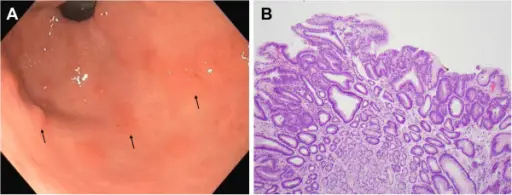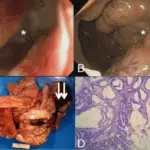Adenomatous polyposis is an area where normal cells that line the inside of a person’s colon form a mass on the inside of the intestinal tract.
What is the Pathology of Adenomatous Polyposis?
The pathology of adenomatous polyposis is:
-Etiology: The cause of adenomatous polyposis is a defected gene.
-Genes involved: POLE, POLD1.
-Pathogenesis: The sequence of events that lead to adenomatous polyposis are not completely known.
-Histology: The histology associated with adenomatous polyposis shows numerous adenomatous polyps form mainly in the epithelium of the large intestine. While these polyps start out benign, malignant transformation into colon cancer occurs when they are left untreated.
How does Adenomatous Polyposis Present?
Patients with adenomatous polyposis typically are both sexes at age range of 35years. The symptoms, features, and clinical findings associated with adenomatous polyposis include: unexplained diarrhea, a long period of constipation, abdominal cramps, decrease in size or caliber of stool, gas pain, bloating, fullness, unexplained weight loss, lethargy and vomiting.
How is Adenomatous Polyposis Diagnosed?
Adenomatous polyposis is diagnosed by biopsy, genetic testing, and colonoscopy.
How is Adenomatous Polyposis Treated?
Adenomatous polyposis is treated by surgical removal.
What is the Prognosis of Adenomatous Polyposis?
The prognosis of adenomatous polyposis is poor. Patients untreated have a median life expectancy of 42 years old. Life expectancy is extended greatly in those treated with colectomy. Upper gastrointestinal cancers and desmoid tumors are the most common causes of death in patients who have undergone colectomy.



